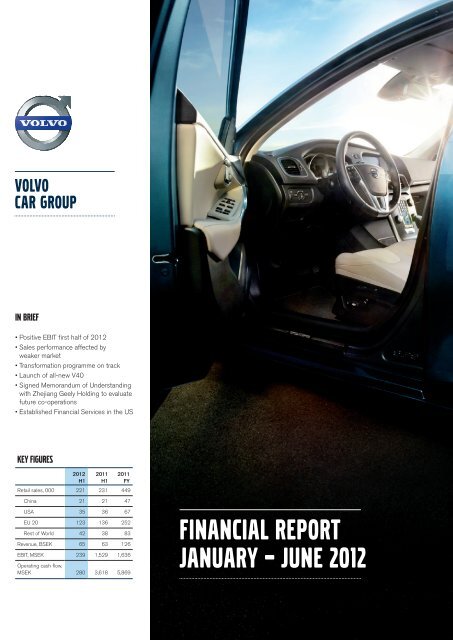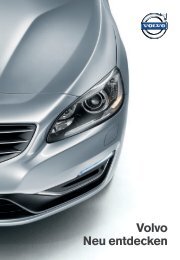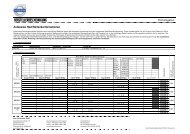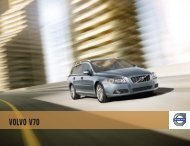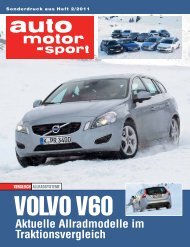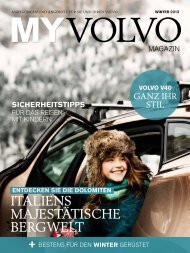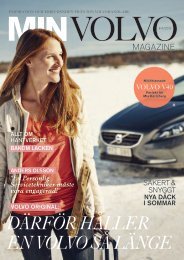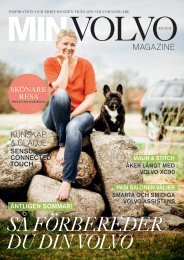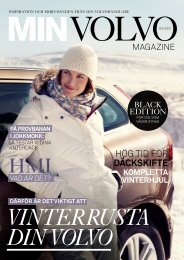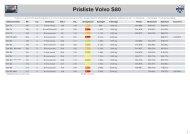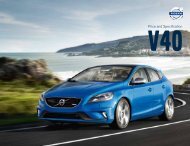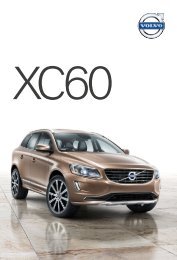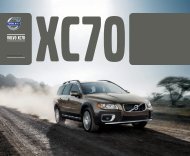Financial Report (January - June 2012) - Volvo
Financial Report (January - June 2012) - Volvo
Financial Report (January - June 2012) - Volvo
Create successful ePaper yourself
Turn your PDF publications into a flip-book with our unique Google optimized e-Paper software.
<strong>Volvo</strong><br />
car GROUP<br />
IN brief<br />
• Positive EBIT first half of <strong>2012</strong><br />
• Sales performance affected by<br />
weaker market<br />
• Transformation programme on track<br />
• Launch of all-new V40<br />
• Signed Memorandum of Understanding<br />
with Zhejiang Geely Holding to evaluate<br />
future co-operations<br />
• Established <strong>Financial</strong> Services in the US<br />
Key figures<br />
<strong>2012</strong><br />
H1<br />
2011<br />
H1<br />
2011<br />
FY<br />
Retail sales, 000 221 231 449<br />
China 21 21 47<br />
USA 35 36 67<br />
EU 20 123 136 252<br />
Rest of World 42 38 83<br />
Revenue, BSEK 65 63 126<br />
EBIT, MSEK 239 1,529 1,636<br />
Operating cash flow,<br />
MSEK 280 3,618 5,869<br />
<strong>Financial</strong> <strong>Report</strong><br />
JanuarY – <strong>June</strong> <strong>2012</strong><br />
I
this is the volvo car group<br />
<strong>Volvo</strong> Car Group’s history goes back to 1927 when the Swedish company <strong>Volvo</strong> Car Corporation<br />
was founded and the first <strong>Volvo</strong> car was launched. <strong>Volvo</strong> Car Group is headquartered<br />
in Gothenburg and has its major manufacturing plants in Torslanda, Sweden and in<br />
Gent, Belgium. In 2011 our 2,238 dealers sold 449,255 cars in more than 100 countries<br />
around the world. In 2010, Zhejiang Geely Holding Group acquired <strong>Volvo</strong> Car Group from<br />
Ford Motor Company. We currently employ around 22,400 people, including around 800<br />
staff relating to the build-up of China as the future second home market.<br />
tHe trAnSFormAtion oF tHe VolVo cAr group<br />
<strong>Volvo</strong> Car Group is going through an encompassing transformation.<br />
A completely new vehicle architecture – Scalable Product Architecture (SPA) – will provide<br />
the foundation for products that will deliver the <strong>Volvo</strong> brand’s key components: safety,<br />
modern Scandinavian design, environmental care and driving dynamics.<br />
The new products, coupled with the industrial and commercial plan in China, will enable<br />
<strong>Volvo</strong> Car Group to reach the ambitions in global sales volumes of 800,000 cars.<br />
About this report<br />
The financials in this report refer to the consolidated business result of <strong>Volvo</strong> Car Group.<br />
This includes <strong>Volvo</strong> Car Corporation (<strong>Volvo</strong> Personvagnar AB), its parent company Geely<br />
Sweden AB, and all its subsidiaries such as <strong>Volvo</strong> Car NV Belgium, all sales companies<br />
around the world including North America, <strong>Volvo</strong> China Investment Co Ltd, and <strong>Volvo</strong> Cars<br />
Real Estate and Assets AB.<br />
Joint ventures and minority interest, are reflected in accordance with IFRS accounting<br />
principles. Audited annual reports are filed in accordance with local statutory requirements<br />
for all legal entities within the group.<br />
In Sweden, audited annual reports for Geely Sweden Holdings AB, Geely Sweden<br />
Automotive AB, Geely Sweden AB and <strong>Volvo</strong> Car Corporation, are filed with the authorities<br />
on an annual basis.<br />
Vision<br />
To be the world’s most progressive and<br />
desired luxury car brand.<br />
objectives<br />
Provide cars people want<br />
Sell over 800,000 vehicles globally<br />
Have a top tier luxury car brand perception<br />
Deliver top industry return on invested capital<br />
Be the employer of choice<br />
VOLVO CAR GROUP H1 <strong>2012</strong>
In a competitive market situation and amidst the most encompassing<br />
transformation in the history of the company, <strong>Volvo</strong> Car<br />
Group reports a positive Earnings Before Interest and Taxes<br />
(EBIT) for the first six months of 239 MSEK (1,529).<br />
Retail sales amounted to 221,309 cars in the first six months of<br />
<strong>2012</strong>, a decline of 4 per cent. This is a consequence of weaker<br />
demand in combination with a transition in our product programme,<br />
where we have phased out our previous S40 and V50 range and<br />
introduced the all-new V40. We see weaker sales in <strong>2012</strong> on most<br />
of our markets compared to 2011, and our sales development will be<br />
our biggest challenge going forward.<br />
In this market situation and amidst the most encompassing transformation<br />
in the history of the company, the <strong>Volvo</strong> Car Group reports a<br />
positive EBIT for the first six months of 239 MSEK (1,529). We have<br />
taken a pro-active approach to protect margins, staying prudent and<br />
not participating fully in incentive wars in some markets.<br />
The all-new V40, launched this spring, will start to support sales in<br />
the second part of <strong>2012</strong>. We are thrilled by the reception of the car,<br />
and given our orderbooks are full, we are reviewing the possibility of<br />
increased capacity.<br />
Another important product launch during the first half year was<br />
the V60 Plug-in-Hybrid, the first proof point of our ambition to develop<br />
<strong>Volvo</strong> Car Group into a leading actor in car electrification. The V60<br />
Plug-in Hybrid will come into production in November, and we have<br />
met a strong interest in the fleet market. We have received orders of a<br />
1,000 cars, corresponding to our production capacity for <strong>2012</strong>.<br />
The all-new V40 and the V60 Plug-in Hybrid are early deliverables<br />
on the new strategy, launched in 2010 following the Zhejiang Geely<br />
Holding’s acquisition of the <strong>Volvo</strong> Car Group. We aim high, with a<br />
goal of selling 800,000 cars globally in 2020. In order to reach this,<br />
we need to take major development steps in the areas of products,<br />
production and competence. Backed by committed owners, we are on<br />
track to deliver on the changes needed.<br />
Two initiatives are key in our transformation strategy and thus driving<br />
several other initiatives. Number one is our new scalable product<br />
architecture, SPA, which will drive commonality across all our product<br />
Ceo comment<br />
lines in important areas like engine and power train, and will help us<br />
delivering on our brand’s key components: safety, modern Scandinavian<br />
design, environmental care and driving dynamics. Moreover,<br />
SPA will deliver a cost structure ensuring competitiveness in the<br />
marketplace. We are following our plan with this important initiative<br />
which represents the largest part of our total long-term transformation<br />
investments. The Torslanda plant in Sweden is now being upgraded<br />
in order to meet the requirements of the SPA architecture, for which<br />
production will commence in early 2015.<br />
The second important initiative is our industrial and commercial<br />
plan for China, <strong>Volvo</strong> Car Group’s future second home market, aiming<br />
at structures and capabilities for annual sales of 200,000 cars. Our<br />
manufacturing footprint is developing according to plan, awaiting<br />
governmental approval. We are establishing our local R&D center,<br />
strengthening our dealer network and competence in our brand and<br />
investing in on-site consumer insight. The strong sales development<br />
in 2011 has declined during the first six months and puts pressure<br />
on areas in our go-to-market capabilities, areas that are now being<br />
addressed in order for us to be prepared once local production has<br />
been approved.<br />
The economical uncertainties in most of our markets will remain<br />
for the rest of the year, and competition is stiff. <strong>2012</strong> and 2013, are<br />
transition years where our ambition will be to protect volumes and<br />
margins, while developing our future product programme and establishing<br />
China as our future second home market. We are currently<br />
taking measures on the cost side, but our strategy remains and so do<br />
our objectives.<br />
We are building robustness into our group and we have begun our<br />
transformation journey. Our strengths lie in dedicated employees, a<br />
clear vision and a long-term strategy that will transform our company<br />
into a truly luxury car brand that will meet the expectations of<br />
demanding <strong>Volvo</strong> customers around the world.<br />
Stefan Jacoby<br />
President and CEO<br />
A poSITIVE EBIT In A<br />
TIME of TrAnSITIon<br />
VOLVO CAR GROUP H1 <strong>2012</strong> 1
Market development<br />
EConoMIC downTUrn AffECTInG ThE CAr IndUSTry<br />
Car Industry Development<br />
In Europe, the first half of <strong>2012</strong> has seen unfavourable macro<br />
economic conditions, resulting in a negative development for the car<br />
industry. In the first half of <strong>2012</strong>, the European car industry was down<br />
6.5 per cent to 6.73 million units (7.20 million). The Swedish car<br />
market amounted to 143,000 units, down 9.2 per cent from the 2011<br />
volume of 157,000. In all markets, competition has become increas-<br />
Industry development (total passenger vehicles registered)<br />
<strong>Volvo</strong> Car Group’s global retail sales for the first half of <strong>2012</strong><br />
amounted to 221,309 cars, down 4.1 per cent compared to the same<br />
period in 2011 (230,746). In 2011, <strong>Volvo</strong> was the fastest growing<br />
luxury brand while sales in the first half of <strong>2012</strong> have been negatively<br />
influenced by uncertainty in major economies and a tougher competitive<br />
climate.<br />
For <strong>Volvo</strong> Car Group, the European market was heavily<br />
affected by the euro zone crisis, China reported a minor increase, the<br />
United States decreased moderately, while markets such as Russia<br />
and Japan showed a positive development. Changes in the product<br />
portfolio had an effect on sales as the <strong>Volvo</strong> S40 and V50 models<br />
were phased out during the spring. These models have been replaced<br />
by the all-new <strong>Volvo</strong> V40 hatchback for which production will reach<br />
full capacity during the autumn of this year.<br />
Europe (EU20)<br />
Retail sales in the European region amounted to 123,279 cars<br />
during the first half of <strong>2012</strong>, representing a decline of 9.1 per cent<br />
compared to the same period in 2011 (135,608). <strong>Volvo</strong> Car Group’s<br />
performance in Europe was strongly affected by a weak home market<br />
with Sweden representing more than one fifth of <strong>Volvo</strong> Car Group’s<br />
total European sales. Additionally, the uncertainty in the euro zone<br />
2<br />
000’<br />
ingly fierce as car makers aim to regain volumes after the previous<br />
economic downturns. The US market totaled 7.26 million units in<br />
the first half of <strong>2012</strong>, up 13.7 per cent from 6.39 million in the same<br />
period of 2011. The car market in China increased by 6.8 per cent to<br />
6.5 million units (6.04 million).<br />
<strong>2012</strong><br />
H1<br />
2011<br />
H1<br />
Change,<br />
%<br />
China* 6,454 6,041 6.8 13,150<br />
USA 7,262 6,385 13.7 12,623<br />
EU 20 6,731 7,197 (6.5) 13,256<br />
of which Sweden 143 157 (9.2) 305<br />
* Preliminary figures for <strong>2012</strong> H1<br />
volvo car GROUP Retail Sales<br />
2011<br />
FY<br />
affected sales in Southern Europe in particular, with sales of <strong>Volvo</strong><br />
cars in France, Italy and Spain declining more than 20 per cent compared<br />
to the first half of 2011. Market share fell from 1.90 to 1.87 per<br />
cent. The <strong>Volvo</strong> XC60 crossover was the best selling model during<br />
the period, followed by the V60 sportswagon and the V50 estate. The<br />
all-new <strong>Volvo</strong> V40 as well as class-leading CO2 improvements in the<br />
product range are expected to support sales growth.<br />
United States<br />
Total sales of <strong>Volvo</strong> Car Group in the US for the first half of <strong>2012</strong><br />
were down by 4.7 per cent to 34,617 cars (36,316), with a decreased<br />
market share from 0.57 to 0.47 per cent of the total passenger<br />
vehicle market. The market situation was characterized by significant<br />
customer incentives to maintain sales volumes at a time when many<br />
consumers were hesitating to invest in new cars. <strong>Volvo</strong> Car Group has<br />
been restrictive in offering incentives resulting in an expected decline<br />
in market share. The phase-out of the <strong>Volvo</strong> S40 sedan model also affected<br />
sales, partly offset by growing demand for the <strong>Volvo</strong> S60 sedan<br />
which was the best selling model during this period, followed by the<br />
<strong>Volvo</strong> XC60 and XC90 models. An all-wheel-drive version of the <strong>Volvo</strong><br />
S60 has recently been introduced to strengthen the product offer in<br />
the US market.<br />
VOLVO CAR GROUP H1 <strong>2012</strong>
China<br />
The sales volume in China totaled 21,378 cars, up 1.7 per cent<br />
compared to the same period in 2011 (21,028). The growth rate has<br />
slowed down compared to the previous year following an increasingly<br />
competitive situation with higher levels of incentives and new product<br />
launches in the luxury segment. The moderate growth rate is also<br />
explained by the extraordinary growth in the first half of 2011 (35.7<br />
per cent), when the recently launched <strong>Volvo</strong> S60 and XC60 models<br />
boosted sales in China. The top three models to date are the <strong>Volvo</strong><br />
XC60 crossover, the S60 sedan and the S80L sedan.<br />
Retail Sales (number of cars sold)<br />
VOLVO CAR GROUP H1 <strong>2012</strong> 3<br />
<strong>2012</strong><br />
H1<br />
2011<br />
H1<br />
Change,<br />
%<br />
China 21,378 21,028 1.7 47,140<br />
USA 34,617 36,316 (4.7) 67,273<br />
EU 20 123,279 135,608 (9.1) 252,217<br />
of which Sweden 26,296 29,580 (11.1) 58,463<br />
of which Germany 17,345 17,712 (2.1) 33,167<br />
of which UK 17,262 17,928 (3.7) 32,770<br />
RoW 42,035 37,794 11.2 82,625<br />
of which Russia 10,173 6,801 49.6 19,209<br />
ToTAL 221,309 230,746 (4,1) 449,255<br />
Market share<br />
rest of world<br />
Sales in the rest of the world amounted to 42,035 cars (37,794),<br />
representing a growth rate of 11.2 per cent. Russia reported growth<br />
of 49.6 per cent, selling 10,173 cars (6,801), where almost 70 per<br />
cent of sales consisted of cars from the XC-range, the XC60 crossover<br />
being the best selling model. Japan continued to grow, up 33.5<br />
per cent to 6,539 cars (4,899), explained by high customer demand<br />
for the <strong>Volvo</strong> V60 sportswagon, the best-seller in Japan. <strong>Volvo</strong> Car<br />
Group will seize further opportunities in these and other overseas<br />
markets to build on the current positive developments.<br />
<strong>2012</strong><br />
H1<br />
2011<br />
H1<br />
Change,<br />
% ppts<br />
China* 0.33 0.35 (0.02) 0.30<br />
USA 0.47 0.57 (0.10) 0.54<br />
EU 20 1.87 1.90 (0.04) 1.91<br />
of which Sweden 18.67 18.68 (0.01) 19.30<br />
Russia 0.77 0.59 0.18 0.78<br />
* Preliminary figures for <strong>2012</strong> H1<br />
Market share is based on registered vehicles by market and not retail sales.<br />
2011<br />
FY<br />
2011<br />
FY
Roadmap to 800,000 cars<br />
<strong>Volvo</strong> Car Group is going through an encompassing transformation.<br />
with new owners since August 2010 in Zhejiang Geely<br />
holding, the group now forms its future, based upon in-house<br />
developed new technology, and long-term growth in its future<br />
second home market, China.<br />
Since 2010, significant progress has been accomplished to<br />
support the long-term objectives.<br />
KEy AChIEVEMEnTS h1 <strong>2012</strong><br />
Several strategic co-operations have materialized during <strong>2012</strong>,<br />
which will be of high significance to ensure the future success of the<br />
company. A Memorandum of Understanding has been signed with<br />
China Development Bank. Under the intent of the MoU, the parties<br />
will evaluate a possible co-operation related to China Development<br />
Bank’s financing of certain <strong>Volvo</strong> Car Group research and development<br />
programs in the area of efficient energy technology, as well as<br />
production facilities in China. Additionally, a MoU has been signed<br />
with Zhejiang Geely to explore further co-operation between the companies.<br />
To support the ambition of leadership within electrification,<br />
the <strong>Volvo</strong> Car Group has advanced its established partnerships with<br />
Siemens and the Swedish energy company Vattenfall.<br />
<strong>Volvo</strong> Car Group aims to establish captive finance solutions<br />
globally, and in February <strong>2012</strong>, the <strong>Volvo</strong> Car Group announced the<br />
establishment of <strong>Volvo</strong> Car <strong>Financial</strong> Services (VCFS), which will<br />
begin providing <strong>Volvo</strong> retailers and customers in the US a variety of<br />
financial services products later this year.<br />
The all-new V40 was launched, and positively received, at Geneva<br />
Motorshow in the first quarter of <strong>2012</strong> and sales of the V60 Plug in<br />
Hybrid commenced.<br />
A nEw VEhICLE ArChITECTUrE - SpA<br />
In the company’s ongoing major product revitalization, the new Scalable<br />
Product Architecture (SPA) and the new engine family <strong>Volvo</strong><br />
Environmental Architecture (VEA) will play a crucial role.<br />
The development of SPA is one of Sweden’s largest industrial<br />
projects ever and all <strong>Volvo</strong> models from the 60 series and upwards<br />
will be based upon it. SPA will significantly improve <strong>Volvo</strong> Car Group’s<br />
competitiveness in key areas such as design, CO2 emissions and<br />
driving dynamics as well as further strengthen <strong>Volvo</strong> Car Group’s<br />
leadership in safety.<br />
Furthermore, SPA will enhance cost efficiency and commonality.<br />
Today <strong>Volvo</strong> Car Group has three vehicle architectures, four sub-platforms<br />
and six power train architectures. With SPA, <strong>Volvo</strong> Car Group<br />
will have one single vehicle architecture and one single power train<br />
architecture for the larger cars (60 range and upwards).<br />
The present production plants in Gothenburg, Gent and Skövde<br />
will be rebuilt for SPA production.<br />
Production of the first SPA vehicle, the successor to the XC90<br />
model, will start in the Torslanda plant in Sweden early 2015.<br />
A nEw EnGInE ArChITECTUrE – VEA<br />
<strong>Volvo</strong> Car Group is taking the next step towards zero emissions<br />
through a new engine range: VEA (<strong>Volvo</strong> Environmental Architecture).<br />
The new engine range consists solely of four-cylinder engines which<br />
can benefit from enhanced performance through electrification or<br />
other spearhead technology. VEA will offer four-cylinder engines with<br />
higher performance than today’s six-cylinder units and lower fuel<br />
consumption than the current four-cylinder generation.<br />
4<br />
nEw prodUCTS<br />
The all-new <strong>Volvo</strong> V40 and the V60 Plug-in Hybrid will be<br />
instrumental to improve sales and during 2013 the majority<br />
of the model range will benefit from a major update.<br />
The all-new <strong>Volvo</strong> V40 enters one of the most competitive<br />
segments in the automotive world, the compact hatchback.<br />
The annual sales volume are expected to reach around 90<br />
000 cars over the lifecycle, of which around 90 per cent in<br />
Europe.<br />
The all-new <strong>Volvo</strong> V40 received an outstanding reception<br />
in the media and was awarded the highest score ever in the<br />
recently published Euro NCAP safety tests.<br />
In November <strong>2012</strong> the production of the <strong>Volvo</strong> V60 Plugin<br />
Hybrid will commence in Sweden. <strong>Volvo</strong> Car Group will be<br />
the first manufacturer on the market with this new breed of<br />
hybrid, a result of close co-operation with Swedish energy<br />
supplier Vattenfall.<br />
See www.media.volvocars.com for further product details.<br />
In a VEA engine the number of unique parts is reduced by 60 percent.<br />
This promotes manufacturing efficiency, quality assurance and<br />
efficiency of new development projects. The new power trains are up<br />
to 90 kg (198 lb) lighter than the present ones and fuel economy is<br />
improved by up to 35 per cent. The VEA engines will be manufactured<br />
in the plant in Skövde, Sweden and the first engine will be on<br />
the market in 2013.<br />
ChInA GrowTh pLAn<br />
<strong>Volvo</strong> Car Group’s long-term goal is to increase sales to 200,000<br />
cars per year in China. In order to achieve this, an industrial plan has<br />
been developed. It contains two assembly plants, one in Chengdu<br />
in Sichuan province and one in Daqing in Heilongjiang province. An<br />
additional engine plant is planned to be located in Zhangjiakou in the<br />
province of Heibei.<br />
The production will be based upon <strong>Volvo</strong> Car Group’s Manufacturing<br />
System ensuring the same processes and quality demands as in<br />
the company’s European facilities. Sourcing in the Chinese market<br />
will be increased and in a locally produced <strong>Volvo</strong> car around 60 to<br />
80 percent will be sourced from China. The initiative will improve the<br />
competitiveness in the luxury segment.<br />
To achieve the goal of 200,000 cars, <strong>Volvo</strong> Car Group also invests<br />
substantially in go-to-market initiatives like brand building and the<br />
development of the dealer network.<br />
USA<br />
In USA, <strong>Volvo</strong> Car Group is seeking long-term solutions to counterbalance<br />
the volatility in exchange rates and thereby secure improved<br />
profitability and sales in the single largest market in the group.<br />
InVESTInG In CoMpETEnCE<br />
The new people strategy is vital to enable the <strong>Volvo</strong> Car Group to<br />
achieve its ambitious objectives. The goal of becoming one of the<br />
most desired employers will be achieved through a culture emphasizing<br />
the core strength of the <strong>Volvo</strong> brand – putting people in the centre.<br />
Recent employee surveys have shown good progress, in particular<br />
in the areas of inspiring leadership and the development opportunities<br />
available in the group.<br />
VOLVO CAR GROUP H1 <strong>2012</strong>
<strong>Financial</strong> summary<br />
poSITIVE EBIT In ThE fIrST hALf of <strong>2012</strong><br />
InCoME STATEMEnT<br />
In the first half of <strong>2012</strong>, revenues increased by 3.9 per cent to<br />
65.3 BSEK (62.9), despite the decline in sales volume, mainly due<br />
to favourable exchange rates.<br />
Gross Profit decreased by 5.5 per cent to 11,149 MSEK (11,795),<br />
with lower sales volume, negative market mix, and increased cost<br />
mainly relating to the start of the V40 production, the new engine<br />
family, and introduction of production flexibility. The impact was partially<br />
offset by favourable exchange rates and positive product mix.<br />
R&D expenses increased by 9.7per cent to 2,227 MSEK (2,031)<br />
to support the new product strategy of the <strong>Volvo</strong> Car Group. Selling,<br />
General and Administrative expenses rose by 13.6 per cent to 7,460<br />
MSEK (6,567), mainly due to an increased number of employees and<br />
intensified market initiatives.<br />
Wholesales*<br />
Thousand<br />
300<br />
250<br />
200<br />
150<br />
100<br />
50<br />
228<br />
234<br />
0<br />
H1 <strong>2012</strong> H1 2011<br />
Sales performance was affected by a difficult external<br />
environment, and retail sales fell 4.1 per cent.<br />
Wholesales, sales to dealers, fell to 227,907 units.<br />
* Wholesales, sales to dealers, drives the financials<br />
and is therefore used in the financial section.<br />
REVENUE<br />
BSEK<br />
80<br />
60<br />
40<br />
20<br />
65.3<br />
Overall, in the first half of <strong>2012</strong>, the <strong>Volvo</strong> Car Group reported EBIT of<br />
239 MSEK (1,529), corresponding to a margin of 0.4 per cent (2.4).<br />
After deducting financial items and taxes, Net Income amounted to a<br />
loss of 254 MSEK (Profit of 1,213).<br />
CASh fLow<br />
In the first half of <strong>2012</strong>, operating cash flow was positive in the<br />
amount of 280 MSEK compared to 3,618 MSEK in the same period<br />
of 2011, affected mainly by unfavourable working capital development.<br />
Total investments increased to 3,322 MSEK (1,324), mainly relating<br />
to the <strong>Volvo</strong> Car Group’s launch of the all-new V40 and the new<br />
engine family VEA.<br />
VOLVO CAR GROUP H1 <strong>2012</strong> 5<br />
62.9<br />
EBIT<br />
MSEK<br />
1,800<br />
1,500<br />
1,200<br />
900<br />
600<br />
300<br />
239<br />
1,529<br />
0<br />
0<br />
H1 <strong>2012</strong> H1 2011<br />
H1 <strong>2012</strong> H1 2011<br />
Revenue increased to 65.3 BSEK, despite lower EBIT decreased to 239 MSEK with increased<br />
sales volume, mainly due to favourable exchange costs due to expansion plans, launch costs of the<br />
rates.<br />
all-new V40 and higher number of employees.
income statement<br />
6<br />
Amounts in million SEK<br />
Revenue 65,325 62,863 125,525<br />
Cost of goods sold (54,176) (51,068) (103,459)<br />
Gross profit 11,149 11,795 22,066<br />
Research & Development expenses (2,227) (2,031) (4,184)<br />
Selling, General & Administrative expenses (7,460) (6,567) (12,954)<br />
Other income & expenses (1,223) (1,668) (3,292)<br />
EBIT 239 1,529 1,636<br />
Interest income & expenses (223) (216) (549)<br />
Other financial income & expenses (239) 336 123<br />
EBT (223) 1,649 1,210<br />
Tax & Non-controlling interests (31) (436) (283)<br />
net Income (254) 1,213 927<br />
balance sheet<br />
Amounts in million SEK<br />
<strong>2012</strong><br />
H1<br />
<strong>2012</strong><br />
30 <strong>June</strong><br />
2011<br />
H1<br />
2011<br />
30 <strong>June</strong><br />
2011<br />
FY<br />
2011<br />
31 Dec<br />
Intangible assets 13,895 12,978 13,624<br />
Property, plant and equipment 31,808 31,900 30,479<br />
Other non current assets 2,611 1,543 2,266<br />
non-current assets 48,314 46,421 46,369<br />
Inventories 15,268 11,922 13,219<br />
Receivables 8,048 6,657 6,039<br />
Other current assets 607 291 211<br />
Cash and cash equivalents 12,832 14,056 15,103<br />
Current assets 36,755 32,926 34,572<br />
Total Assets 85,069 79,347 80,941<br />
Equity 22,070 22,035 22,647<br />
Provisions, non-current 12,504 12,451 12,565<br />
Non current liabilities 9,144 7,966 8,595<br />
Total non-current liabilities 21,648 20,417 21,160<br />
Provisions, current 12,925 11,771 11,502<br />
Trade payables 16,094 14,387 15,464<br />
Other current liabilities 12,332 10,737 10,168<br />
Total current liabilities 41,351 36,895 37,134<br />
Total equity and liabilities 85,069 79,347 80,941<br />
VOLVO CAR GROUP H1 <strong>2012</strong>
cash flow<br />
Amounts in million SEK<br />
EBIT 239 1,529 1,636<br />
Adjustments for items not affecting cash flow 3,316 2,019 3,690<br />
VOLVO CAR GROUP H1 <strong>2012</strong> 7<br />
<strong>2012</strong><br />
H1<br />
2011<br />
H1<br />
2011<br />
FY<br />
3,555 3,548 5,326<br />
Interest and other financial expenses (177) (152) (308)<br />
Tax paid (620) (276) (572)<br />
Change in Receivables (2,010) (1,137) (519)<br />
Change in Inventories (2,050) (1,781) (3,078)<br />
Change in Trade Payables 630 1,112 2,189<br />
Change in Other 952 2,304 2,831<br />
total operating cash Flow 280 3,618 5,869<br />
total investing cash Flow (3,322) (1,324) (3,037)<br />
Proceeds from borrowings 1,001 4,001 4,001<br />
Repayment of borrowings (230) (2,301) (2,301)<br />
Other – 107 616<br />
total Financing cash Flow 771 1,807 2,316<br />
total cash Flow (2,271) 4,101 5,148<br />
KEY RATIOs<br />
Revenues, MSEK 65,325 62,863 125,525<br />
Gross profit, MSEK 11,149 11,795 22,066<br />
Gross profit, % 17.1 18.8 17.6<br />
EBIT, MSEK 239 1,529 1,636<br />
EBIT, % 0.4 2.4 1.3<br />
Net Income, MSEK (254) 1,213 927<br />
Cashflows from operating & investing activities, MSEK (3,042) 2,294 2,832<br />
Return on equity (ROE), % (1.1) 5.6 4.2<br />
Return on capital employed (ROCE), % 0.6 3.7 3.9<br />
Return on invested capital (ROIC), % 0.7 4.3 4.8<br />
Equity ratio, % 25.9 27.8 28.0<br />
<strong>2012</strong><br />
H1<br />
2011<br />
H1<br />
2011<br />
FY
information and contact<br />
You are welcome to contact us by e-mail:<br />
lfortgen@volvocars.com or Telephone: +46-(0)31-59 19 02.<br />
Contact person: Linn Fortgens,<br />
Head of Investor Relations.<br />
<strong>Volvo</strong> Car Group Headquarters<br />
50400 - HA2S<br />
SE-405 31 Gothenburg, Sweden<br />
www.volvocars.com<br />
Accounting principle<br />
The <strong>Volvo</strong> Car Group has transitioned to IFRS accounting principles, implemented in <strong>2012</strong> and with 2011<br />
comparative figures restated accordingly. Note that results are not fully comparable with the operating EBIT<br />
announced historically. In prior communication, the operating results excluded special items, adjustments<br />
according to IFRS such as capitalization requirements and purchase price adjustments.<br />
During <strong>2012</strong> the following accounting changes have been made. As of April 1, hedge accounting related to<br />
cash flow hedging was implemented. As of <strong>January</strong> 1, net financial expenses relating to pensions have been<br />
reclassified from operating income to financial items.<br />
definitions<br />
comparative figures:<br />
The equivalent period is shown in brackets<br />
retail Sales:<br />
Sales to end customers<br />
Wholesales:<br />
Sales to dealers<br />
eu20:<br />
Sweden<br />
Norway<br />
Denmark<br />
Finland<br />
Netherlands<br />
Belgium/Luxemburg<br />
France<br />
Spain<br />
Italy<br />
Greece<br />
Portugal<br />
UK<br />
Ireland<br />
Germany<br />
Switzerland<br />
Austria<br />
Poland<br />
Hungary<br />
Czech Republic<br />
Solberg


